1. Karmakanda (Ritualistic worship) and chanting
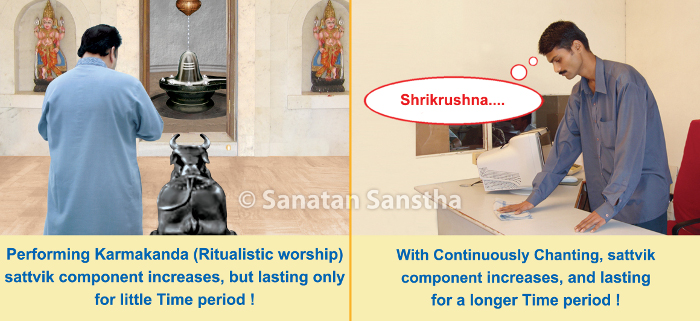
One who chants a ‘Name’ (God’s Name) according to the stage of mental worship (Upasanakanda) which is of a higher level than ritualistic worship need not observe restrictions of the ritualistic worship because the benefit derived from the observance of restrictions is very little and short-lived. For instance, going to a temple increases the sattvik component by a mere 0.0001% lasting only 15 minutes, touching a woman during her menses increases the Raja component of the one touching her by a mere 0.0001% lasting only 15 minutes. As against this, the sattvik component rises by 5% during chanting. Thus, these restrictions of the stage of ritualistic worship do not have special significance for one who chants continuously.
2. Meditation and chanting
Dr. Athavale (Compiler) : Which of the two spiritual practices is superior, meditation or chanting ?
H.H. Bhaktaraj Maharaj : Chanting is superior to meditation for the following reasons.
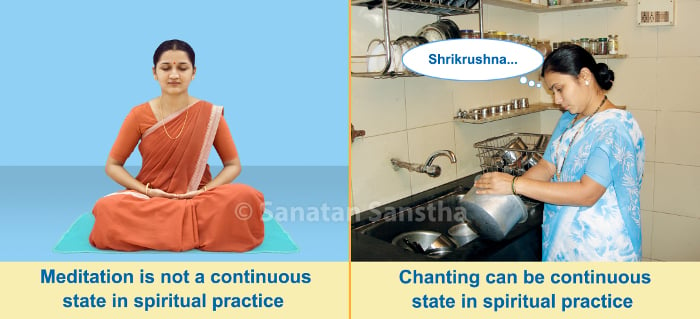
A. Continuity in spiritual practice
Samadhi (Meditation) is not a continuous state, whereas the spiritual practice of chanting can be continuous. A continuous spiritual practice is essential to merge with the Divine principle.
B. Atmanubhuti (True wakeful state)
The seeker who is in a state of meditation returns to the wakeful state because of the attraction toward the gross. On the other hand, the seeker who chants continuously is ‘continuously awake’; which implies that he is in a state of ‘continuous meditation’ !
C. Attraction toward the gross
Attraction toward the gross is due to the impressions in the subconscious mind, which means that during meditation there is an opposition to and not elimination of the tendencies of the subconscious mind. Only through chanting can these tendencies be eliminated.
D. Welling up of subtle thoughts
Keeping the mind thoughtless means the attention is directed neither outside nor inside. This is in appropriate, as in this state subtle impressions do surface sometime or the other. However, when one concentrates on the ‘Name’, subtle impressions do not surface. Therefore, chanting the ‘Name’ is important than having a thoughtless mind.
E. Spiritual experience and spiritual level
Experiences during meditation are not indicative of the spiritual level of a person, whereas experiences of one who chants are indicative of his level.
F. True and false spiritual experiences
Spiritual experience as a result of chanting is real because the one chanting God’s Name has blended with the Name. As against this, the spiritual experience of ‘nothingness’ during meditation is illusory because in this state there is only dissolution of the mind.
G. Artificial and natural states
Meditation is an artificial or induced state, whereas through the ‘Name’, one is able to attain the natural state of being in sahajavastha (communion with God).’
3. Bhajans and chanting
Instead of singing film or sentimental songs, it is always beneficial to sing bhajans for spiritual progress as they contain Chaitanya. Besides, bhajans comprise of many words and notes. Through spiritual practice, a seeker has to go from ‘many’ to ‘one’ and from ‘one’ to ‘nothingness’. Since there is only one word and one note in the ‘Name’, it contains more chaitanya. Hence, instead of singing bhajans, chanting the Name is more appropriate. The word bhajan has originated from the words bhaj + na. ‘Bhaj’ means bhakti (devotion) and ‘na’ signifies continuity. Thus, its real meaning is ‘continuous devotion’.
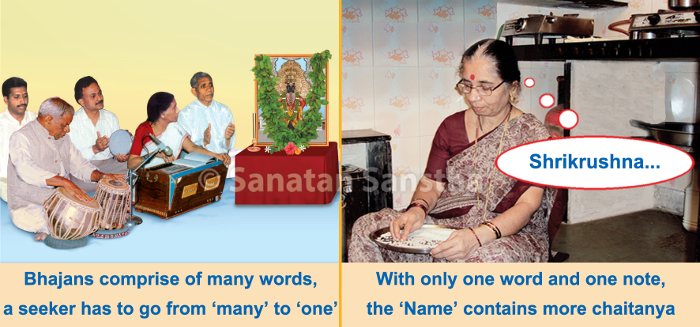

 Why do we chant Name of Kuladevi instead of Kuladev?
Why do we chant Name of Kuladevi instead of Kuladev? Guidance by His Holiness Bhagwantkumar Menrai on how to coordinate chanting the Name of God...
Guidance by His Holiness Bhagwantkumar Menrai on how to coordinate chanting the Name of God...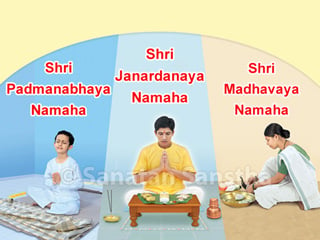 How different chants can help avoid unfavourable incidents ?
How different chants can help avoid unfavourable incidents ? How chanting purifies the mind ?
How chanting purifies the mind ? How does chanting help us to achieve oneness with God?
How does chanting help us to achieve oneness with God?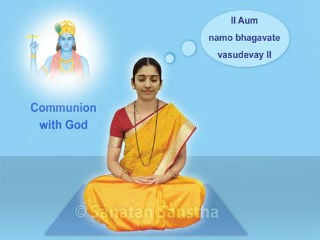 Spiritual benefits of chanting God’s Name
Spiritual benefits of chanting God’s Name